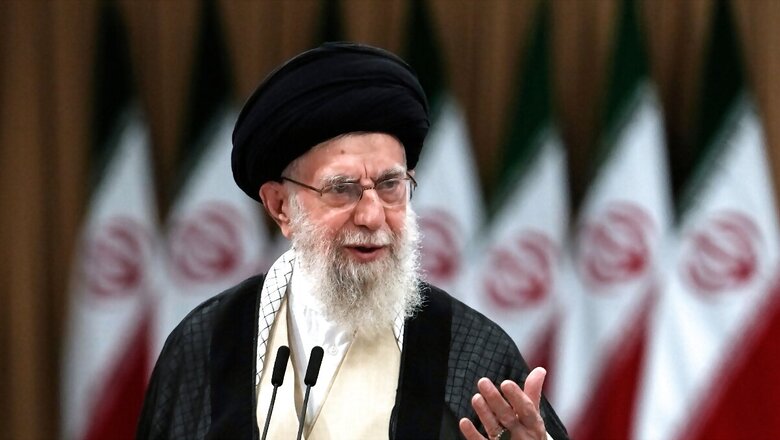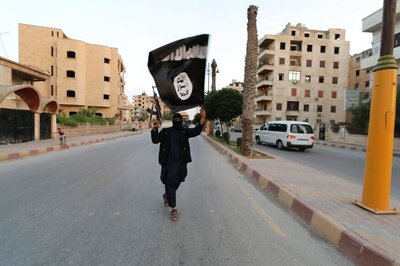
views
Addressing a gathering of clerics on September 16, Iran’s Supreme Leader Ayatollah Ali Khamenei said: “We cannot consider ourselves to be Muslims if we are oblivious to the suffering that a Muslim is enduring in Myanmar, Gaza, India, or any other place.”
Not surprisingly, India’s Ministry for External Affairs issued a terse and hard-hitting response, saying, “We strongly deplore the comments made regarding minorities in India by the Supreme Leader of Iran. These are misinformed and unacceptable. Countries commenting on minorities are advised to look at their own record before making any observations about others.”
Ayatollah Khamenei’s comments were surprising, given the growing closeness between India and Iran. Will his statement be a setback for India-Iran ties, and if so, to what extent? As it is, some headwinds have already appeared, which could adversely impact bilateral cooperation.
Ayatollah’s words tantamount to inciting anti-India feelings among Muslims across the globe. Why did he make this statement? Does he really think that Indian Muslims are also suffering like the Palestinians in Gaza and the Rohingyas in Myanmar? Why did he bracket them all together?
Did he not realise that his remarks would not go down well with the Indian government? Did he expect that the Government of India and the media in our country would just smile and look the other way while he said things that are so hateful and inciteful? The reaction of the Ministry of External Affairs clearly reflects India’s displeasure.
I happened to discuss Khamenei’s remarks with someone who is clearly an apologist for Iran. He made a weird remark that the Indian media is demonising Khamenei. The truth is that the Ayatollah’s remarks gave the unambiguous impression that he was demonising the Indian government.
Another such apologist tried to convince me that the Ayatollah was simply ‘posturing’, that such rhetoric is something that he engages in on and off to portray Iran as the leader of the Muslim world, and that we should not take his remarks to mean anything more than just that. Even if Khamenei was only posturing, should he have targeted a friendly country like India in this brazen manner?
Such anti-India public pronouncements could do a lot of damage as regards the public perception of India in Iran. After all, the Supreme Leader is the person who wields ultimate authority in Iran, and his words do influence how many Iranians view India.
Khamenei has said such things in the past also. In August 2019, after the abrogation of Article 370, Khamenei had said while leading the Friday prayers in Tehran that ‘revoking Kashmir’s autonomy was an ugly act’ and had ‘warned India to prevent confrontations with the Muslims’ as this is not in India’s interest. He had also tweeted, ‘We have good relations with India, but we expect the Indian government to adopt a just policy towards the noble people of Kashmir and prevent the oppression and bullying of Muslims in this region.’ Again, in March 2020, he had said, ‘The hearts of Muslims all over the world are grieving over the massacre of Muslims in India,’ and had urged India to ‘stop the massacre of Muslims’. Clearly, the Indian External Affairs Ministry decided that enough is enough and that it is time to show him the mirror on the situation of minorities in Iran.
Will these recent remarks by Khamenei damage the relationship with India? It takes years to build relationships, but irresponsible and hurtful remarks can do lasting damage. India has assisted Iran in a number of ways. For example, during Covid-19, India provided 1,125,000 doses of vaccines and medical supplies to Iran. Malathion insecticide was provided to Iran in 2020 and 2021 to combat desert locusts. India also provided 103 tonnes of disaster relief aid to Iran during the 2019 floods.
More recently, in May 2024, India signed a 10-year contract with Iran to develop and operate the port of Chabahar. Under the agreement, India will invest about $120 million in developing the port, and there will be an additional $250 million in financing, bringing the contract’s value to $370 million.
There are some factors that are already threatening to adversely impact India’s efforts to assist Iran in the development of Chabahar. First, US sanctions against Iran could become even more strict due to the tensions in West Asia. As it is, we had to stop buying oil from Iran due to US sanctions, and our investments in Chabahar could also be endangered. US State Department deputy spokesman Vedant Patel, when asked about the Indo-Iranian Chabahar deal, had told reporters that US sanctions on Iran remain in place and warned that Washington will continue to enforce them. “Any entity, anyone considering business deals with Iran—they need to be aware of the potential risks that they are opening themselves up to and the potential risk of sanctions,” Patel had told reporters. Thus, India’s ongoing efforts to develop this port could be very adversely impacted.
Second, Chabahar is situated in the Sistan-Baluchistan province of Iran, which is affected by insurgency. A low-intensity insurgency asymmetric conflict has been going on there between the Iranian security forces and several Baluch Sunni militant organisations designated as terrorist organisations by the Iranian government. The three most prominent Baluch rebel organisations in Iran are Jundallah, Jaish ul-Adl, and Ansar-al-Furkan, which are allied with Pakistani Baloch groups and want to break away from Iran. This insurgency in Sistan-Baluchistan could intensify as Iran gets more and more involved in the West Asian crisis. The insurgents could also target Indians working in the Chabahar port in the same way as Chinese workers in Gwadar port have been targeted by the Baloch militants in Pakistan .
Third, Pakistan’s intelligence agencies have clandestine contacts with some Sunni Iranian Baloch militants. This could pose a danger too. The case of Kulbhushan Jadhav should not be forgotten. While Pakistan claims that he was arrested from Chaman in Pakistan’s Balochistan province, according to Indian sources, Kulbhushan Jadhav was kidnapped by Mullah Omar Irani of the Iranian Bauch militant group Jaish ul-Adl from Sarbaz city (capital of Iran’s Sistan-Baluchistan province) and later handed over to the Pakistan Army.
These are some important factors that already threaten India’s efforts to develop Chabahar port and thus help Iran, which is in dire need of investments after US sanctions were imposed on it. Thus, the statement by Iran’s Supreme Leader about Muslims in India, in which he says that they are suffering like the Muslims in Gaza and in Myanmar, is not at all conducive towards promoting the right atmosphere for bilateral cooperation.
The writer is a retired Indian diplomat and had previously served as Consul General in New York. Views expressed in the above piece are personal and solely those of the author. They do not necessarily reflect News18’s views.




















Comments
0 comment